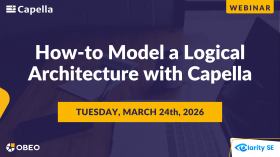 How-to Model a Logical Architecture with Capella
Tuesday, March 24th, 2026 | 9AM Paris (CET)
Register now!
While it is easy to conceptualise the final synthesised physical architecture and the black-box system analysis, logical architectures, by their nature, are abstract and more open to interpretation.
In this presentation, Tim Carter will explore a number of different interpretations of the ARCADIA logical architecture and in which scenarios they may be useful in achieving modelling goals and adding value.
***
Presented by:
Tim CarterClarity SE
Tim Carter is a professional engineer with 25+ years of experience with complex systems engineering. Tim is a Principal Systems Engineer and experienced engineering leader at the corporate, business unit, programme, and project levels. Tim's systems engineering experience covers the breadth of defence, transport, and infrastructure projects. Tim is experienced in rolling out MBSE approaches to engineering organisatio...
How-to Model a Logical Architecture with Capella
Tuesday, March 24th, 2026 | 9AM Paris (CET)
Register now!
While it is easy to conceptualise the final synthesised physical architecture and the black-box system analysis, logical architectures, by their nature, are abstract and more open to interpretation.
In this presentation, Tim Carter will explore a number of different interpretations of the ARCADIA logical architecture and in which scenarios they may be useful in achieving modelling goals and adding value.
***
Presented by:
Tim CarterClarity SE
Tim Carter is a professional engineer with 25+ years of experience with complex systems engineering. Tim is a Principal Systems Engineer and experienced engineering leader at the corporate, business unit, programme, and project levels. Tim's systems engineering experience covers the breadth of defence, transport, and infrastructure projects. Tim is experienced in rolling out MBSE approaches to engineering organisatio...
Subscribe to this list via RSS
Blog posts tagged in webinar
 How-to Model a Logical Architecture with Capella
Tuesday, March 24th, 2026 | 9AM Paris (CET)
Register now!
While it is easy to conceptualise the final synthesised physical architecture and the black-box system analysis, logical architectures, by their nature, are abstract and more open to interpretation.
In this presentation, Tim Carter will explore a number of different interpretations of the ARCADIA logical architecture and in which scenarios they may be useful in achieving modelling goals and adding value.
***
Presented by:
Tim CarterClarity SE
Tim Carter is a professional engineer with 25+ years of experience with complex systems engineering. Tim is a Principal Systems Engineer and experienced engineering leader at the corporate, business unit, programme, and project levels. Tim's systems engineering experience covers the breadth of defence, transport, and infrastructure projects. Tim is experienced in rolling out MBSE approaches to engineering organisatio...
How-to Model a Logical Architecture with Capella
Tuesday, March 24th, 2026 | 9AM Paris (CET)
Register now!
While it is easy to conceptualise the final synthesised physical architecture and the black-box system analysis, logical architectures, by their nature, are abstract and more open to interpretation.
In this presentation, Tim Carter will explore a number of different interpretations of the ARCADIA logical architecture and in which scenarios they may be useful in achieving modelling goals and adding value.
***
Presented by:
Tim CarterClarity SE
Tim Carter is a professional engineer with 25+ years of experience with complex systems engineering. Tim is a Principal Systems Engineer and experienced engineering leader at the corporate, business unit, programme, and project levels. Tim's systems engineering experience covers the breadth of defence, transport, and infrastructure projects. Tim is experienced in rolling out MBSE approaches to engineering organisatio...
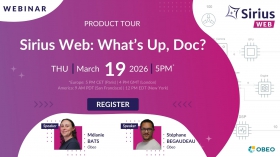 Sirius Web: What’s Up, Doc?
Thursday, March 19th, 2026 | 5PM Paris (CET)
Register now!
If you’ve been wondering what’s up in the world of web-based modeling, Sirius Web is here for you. It’s an open-source platform that lets you build and use custom modeling tools directly in the browser, bringing the power of domain-specific modeling to modern, collaborative environments.Sirius Web has been growing fast, almost as fast as a family of rabbits, with new features and improvements multiplying every release. The latest updates bring smoother diagram editing, faster rendering, richer customization, better scalability, and new APIs for extending and integrating Sirius Web.We’ll also take a look ahead at upcoming capabilities like collaborative modeling and broader ecosystem integration. Join us for a fun and insightful tour of what’s new, and don’t come alone! After all, things grow faster when the bunnies team up. That’s all folks!
***
Presented by:
Mélanie BatsObeo
...
Sirius Web: What’s Up, Doc?
Thursday, March 19th, 2026 | 5PM Paris (CET)
Register now!
If you’ve been wondering what’s up in the world of web-based modeling, Sirius Web is here for you. It’s an open-source platform that lets you build and use custom modeling tools directly in the browser, bringing the power of domain-specific modeling to modern, collaborative environments.Sirius Web has been growing fast, almost as fast as a family of rabbits, with new features and improvements multiplying every release. The latest updates bring smoother diagram editing, faster rendering, richer customization, better scalability, and new APIs for extending and integrating Sirius Web.We’ll also take a look ahead at upcoming capabilities like collaborative modeling and broader ecosystem integration. Join us for a fun and insightful tour of what’s new, and don’t come alone! After all, things grow faster when the bunnies team up. That’s all folks!
***
Presented by:
Mélanie BatsObeo
...
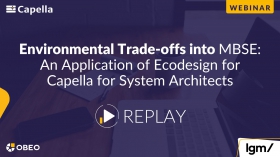 Environmental Trade-offs into MBSE: An Application of Ecodesign for Capella for System Architects
(Re)Watch the replay of the Capella Webinar - Thursday, February 12th, 2026 | 5PM Paris (CET)
This webinar shows how environmental analysis can be brought into the MBSE workflow using the Ecodesign for Capella add-on. Traditionally, life cycle and environmental trade-off assessments are done outside system models and too late to influence architecture. The session explains how architects can use Capella with built-in environmental criteria and trade-off features to assess impacts within their usual modeling environment. A practical use case on a drone inspection product line illustrates the approach, its benefits, and lessons learned.
***
Presented by:
Thibault MontigaudLGM
Thibault Montigaud joined LGM in 2016 after graduating with a degree in Industrial Risk Management from INSA Centre Val de Loire in Bourges and a degree in Automation from the University of Orléa...
Environmental Trade-offs into MBSE: An Application of Ecodesign for Capella for System Architects
(Re)Watch the replay of the Capella Webinar - Thursday, February 12th, 2026 | 5PM Paris (CET)
This webinar shows how environmental analysis can be brought into the MBSE workflow using the Ecodesign for Capella add-on. Traditionally, life cycle and environmental trade-off assessments are done outside system models and too late to influence architecture. The session explains how architects can use Capella with built-in environmental criteria and trade-off features to assess impacts within their usual modeling environment. A practical use case on a drone inspection product line illustrates the approach, its benefits, and lessons learned.
***
Presented by:
Thibault MontigaudLGM
Thibault Montigaud joined LGM in 2016 after graduating with a degree in Industrial Risk Management from INSA Centre Val de Loire in Bourges and a degree in Automation from the University of Orléa...
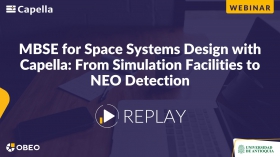 MBSE for Space Systems Design with Capella: From Simulation Facilities to NEO Detection
Watch the Replay - Thursday, January 22nd, 2026 | 5PM Paris (GMT 1:00)
Join us for a new Capella Webinar dedicated to space systems engineering, featuring two projects from the University of Antioquia that illustrate how MBSE can support early design decisions, structure complex architectures, and improve confidence in the feasibility of ambitious space missions.
The session will cover:
The design and development of a proof of concept for a modular vacuum chamber to simulate space like conditions.
The conceptual design of a space based observatory for Near Earth Object (NEO) detection.
***
Presented by:
Paula Andrea García SuárezUniversidad de Antioquia
Aerospace Engineer specialized in systems and project design for space applications. Experienced in MBSE, requirements engineering, and prototype development. Skilled in CAD modeling, mission analysis, and hands-on work...
MBSE for Space Systems Design with Capella: From Simulation Facilities to NEO Detection
Watch the Replay - Thursday, January 22nd, 2026 | 5PM Paris (GMT 1:00)
Join us for a new Capella Webinar dedicated to space systems engineering, featuring two projects from the University of Antioquia that illustrate how MBSE can support early design decisions, structure complex architectures, and improve confidence in the feasibility of ambitious space missions.
The session will cover:
The design and development of a proof of concept for a modular vacuum chamber to simulate space like conditions.
The conceptual design of a space based observatory for Near Earth Object (NEO) detection.
***
Presented by:
Paula Andrea García SuárezUniversidad de Antioquia
Aerospace Engineer specialized in systems and project design for space applications. Experienced in MBSE, requirements engineering, and prototype development. Skilled in CAD modeling, mission analysis, and hands-on work...
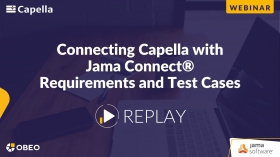 Jama Connect Joins the Capella Ecosystem
Watch the Replay of the Capella webinar - Thursday, December 11, 2025 | 5PM Paris (GMT 1:00)
Complex systems require strong alignment across teams. When requirements, architecture and test cases live in separate tools, ensuring traceability becomes difficult.In this webinar, you will see how to publish Capella models to a controlled web server and create bidirectional traceability with Jama Connect® artifacts. This integration removes manual checks and keeps all engineering data synchronized.
***
Presented by:
Patrick KnowlesJama Software
Experienced Systems Engineer and Project Manager with a demonstrated history of working in the Aerospace & Defense industry. Practitioner of both traditional waterfall product development and Agile methodologies and tools such as Azure DevOps and Jira. Strong systems thinker with a Bachelor of Engineering - BSE focused in Aerospace Engineering from University ...
Jama Connect Joins the Capella Ecosystem
Watch the Replay of the Capella webinar - Thursday, December 11, 2025 | 5PM Paris (GMT 1:00)
Complex systems require strong alignment across teams. When requirements, architecture and test cases live in separate tools, ensuring traceability becomes difficult.In this webinar, you will see how to publish Capella models to a controlled web server and create bidirectional traceability with Jama Connect® artifacts. This integration removes manual checks and keeps all engineering data synchronized.
***
Presented by:
Patrick KnowlesJama Software
Experienced Systems Engineer and Project Manager with a demonstrated history of working in the Aerospace & Defense industry. Practitioner of both traditional waterfall product development and Agile methodologies and tools such as Azure DevOps and Jira. Strong systems thinker with a Bachelor of Engineering - BSE focused in Aerospace Engineering from University ...


